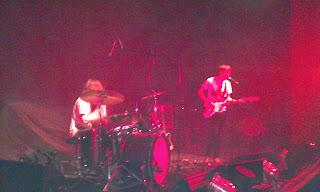 |
| Source: Wikimedia |
Every music journalist who got their hands on a press copy of the CD has been raving about how "daring" Weight of Love, the first track on the album, is. Sure, it's daring only in that it's the longest song they've ever done (clocking in at 6.50) but apart from that, it feels like an utterly natural start to the album. Time passes without you noticing, because everything is just so well timed so as to create a seamless transition from one section into another. At it's core, though, the epic guitar solos and blues allusions are full of anguish and pain. Considering that the album was written when guitarist and vocalist Dan Auerbach was going through an apparently quite messy and public divorce, this isn't very surprising. There's so much behind that fuzzy guitar solo at the beginning that us as mere listeners can't even begin to access until you see the passion with which they perform live. That's when a whole other dimension is added on to their music, and my suspicion is that they will most certainly not disappoint with respect to Turn Blue.
 |
| Source: Wikipedia |
I had a very strange experience going from the piano-led In Our Prime to Gotta Get Away. Bearing in mind that In Our Prime is one of the few Keys songs that places such a big emphasis on the piano (and is thus by implication the most soulful and meaningful of the lot, naturally yah) it's quite a shock to suddenly go from that to Gotta Get Away, which I thought was a Rolling Stones song coming up on shuffle on my iPod. Auerbach seems to be channeling his inner Jagger (don't pretend you don't have one) with this one, especially with the opening guitar solo, a sound so typical of a lot of the songs on Exile On Main Street. It's a good old 60s influenced toe-tapper (excuse the word, I instantly feel 40 years older for having used it) that aims to please. More please.
At the end of this, I really don't know what to say. Turn Blue is an album that wears the band's experiences on its sleeve, and is consequently dripping with heart ache and deep, irreparable pain. Through this, they've kept in line with their general tendency to top whatever the previous album was by about a million. Despite the album's individuality, I can't help but hear Iggy Pop's Turn Blue whenever I see the title, no matter how hard I try. The struggles of the musically cultured *sigh*. Still, the contents itself couldn't be anything but Black Keys. Thank the lord.
Rating: 9/10
Recommended Tracks:
10 Lovers
It's Up To You Now
Weight of Love


.jpg)










